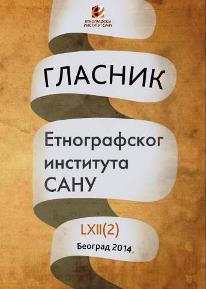Другост варварке: Медеја Еурипидова и Медеја Велимира Лукића
The Otherness of a Barbarianess: Euripides’ Medea and Medea by Velimir Lukić
Author(s): Đurđina Šijaković MaidanikSubject(s): Anthropology
Published by: Етнографски институт САНУ
Keywords: Greek; barbarian; citizen of a polis, woman; self, other; Medea; Euripides (cca 480–406 BC); Velimir Lukić (1936–1937)
Summary/Abstract: Belonging to a social community, a nation, a culture or a religion, can be expressed by stressing differences and borders between us and others, between our collective self and their otherness. Achievements of classical Greek culture for us are primarily bound to the polis, city-state, but classical Greek literature gives quite significance to the definition of universal Greek identity by creating the figure of a barbarian on the opposite side. This contrast between Greeks and barbarians, not noticeable in the literature of archaic period, grows more and more important (while the notion of the word barbarian becomes more pejorative) with gradual intrusion of Persian domination over west area of Asia Minor from the middle of VI BC and with successful resistance of many Greek states in the first half of V BC. The basic feature that defines the notion βάρβαρος is a lack of moral responsibility indispensable for enjoying (but active enjoying, applying, engaging in, practicing) political freedom. Moral responsibility and political freedom are closely connected through λόγος – which is ability to reason and also ability to speak (in Greek). The image of barbarian is further elaborated with features of cruelty and excessiveness of all kinds (especially when it comes to somatic pleasures), i.e. a lack of moderation, so essential to Greeks. On the other hand, “to be Greek” meant: to be a citizen of a Greek polis having full civic rights. This further means: exclusively men. Otherness in being a barbarian, hence, goes hand in hand with Otherness of a woman in ancient Greek world. This polarity also includes the tension between πόλις and οἶκος, i.e. the tension between public–political and private–family life. Bearing this dichotomy in mind, I am re-reading two theatric plays: Euripides’ (cca 480–406 BC) tragedy Medea and radio-drama Medea of Serbian writer Velimir Lukić (1936–1937), one of many literary and art-works inspired by Euripides’ tragedy and Greek myth. Euripides’ Medea influenced on the tradition of this famous barbarian woman from Colchis, passionate and cruel sorceress, more than any other text did. If this writer didn’t make up Medea’s infanticide (performed in order to punish her unfaithful husband) on his own, then it was him who gave a fixed form to this variant of the myth. She is a refugee from her own home and country, a newcomer in Greece on the other side; she is a dangerous foreigner, a barbarian, passionate woman and sorceress; a threat and an ill omen to the manliness and male principle (and ambiguously a potential help to it). In order to avenge to her infidel husband, Greek Jason, this Colchian woman becomes a murderer of her own (two male!) children in the Euripides’ tragedy. The bloody epilogue of love between Greek and Colchian is described by Velimir Lukić as well. In his radio-drama Medea, eternal and varible, male and female, Greek and barbarian (in a particular aspect) are juxtaposed. Lukić constantly has in mind an abys
Journal: Гласник Етнографског института САНУ
- Issue Year: LXII/2014
- Issue No: 2
- Page Range: 181-200
- Page Count: 20
- Language: Serbian

